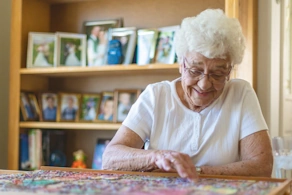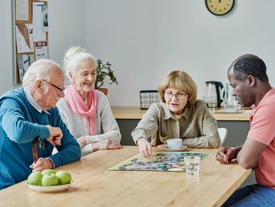Lifelong Learning for Seniors: Benefits of Continuing Education in Later Life
Our Key Takeaway
Lifelong learning keeps seniors mentally sharp and emotionally fulfilled by offering continued growth, social connection, and purpose. Learning new skills, joining classes or workshops, and embracing technology help delay cognitive decline and support overall well-being.
Lifelong learning has evolved from simple knowledge acquisition and instead emphasizes curiosity for learning at any stage in life. More older people are getting into education as they age in the Canada.
There is truly no age restriction when it comes to learning, whether at the local community colleges or through an online course, and the data for older adult academic enrollments have shown exponential increases.
This trend has changed over time to reflect a need to not only be mentally alert but also connect with society, express passions, and succeed in the ever-changing world. Let's dig into the advantages driving this very inspiring movement!
Life Assure Product Quiz
Take our 30 second quiz and discover which Life Assure medical alert device is the right fit for you or a loved ones.
Life Assure Product Quiz
Take our 30 second quiz and discover which Life Assure medical alert device is the right fit for you or a loved ones.
Concept of Lifelong Learning for Elderly People

Lifelong learning for seniors is an ongoing, self-directed pursuit of knowledge beyond any traditional education setting. It encompasses the discovery of new interests and skills, but it also retains one's ties to a world of ideas.
For seniors, lifelong learning addresses personal growth, social interaction, and the joy of discovery, among other things besides intellectual curiosity.
A revolutionary thing is happening here, where programs just for seniors are popping up everywhere, and it's all about keeping the learning vibe alive.
Osher Lifelong Learning Institutes (OLLI) offers a bunch of cool classes in art, science, and history aimed at folks who are 50 and up.
Benefits of Seniors’ Lifelong Education
Let's saunter through why lifelong education is so important for the elderly. There are an array of reasons to justify that:
Mental and cognitive benefits
We must never let our brains rust because, at all ages, our overall health and well-being are kept in check.
Boost in Neuroplasticity:
The impact of lifelong learning upon neuroplasticity-the ability of the brain to shape and reorganize synaptic connections is profound. When you learn to play the guitar or code, it has a different impact on different parts of the brain, making it more versatile.
Prevention of Cognitive Decline:
A good number of studies based in the Canada report a positive relationship between continuing education and lower chances of developing Alzheimer's disease and other forms of dementia.
Intellectually stimulating activities will keep your brain busy, preventing or delaying cognitive decline.
Memory and Problem-Solving Skills:
Learning activities directly improve memory retention and problem-solving ability. For instance, language classes enhance verbal recall and cognitive multitasking, whereas technology workshops improve analytical thinking.
Educated seniors are more likely to find their way around everyday problems, from managing money to understanding new technology.
Emotional and Psychological Benefits

Enlightening yourself with new things and keeping your mind busy will keep your unharnessed emotions in check and prevent you from being a grumpy grandpa/grandma.
Combating Loneliness:
A good educational program can help reduce the isolation of older adults as it provides avenues for socializing.
With classes, workshops, and group learning activities, an older adult can relate to other fellow older adults with common interests that are essential for network development or the growth of friendships and social ties.
Emotional Resilience:
Lifelong learning further plays a great role in enhancing the emotional resilience of seniors by instilling a feeling of purpose and accomplishment.
Being involved in academic activities helps give a positive look, promotes well-being mentally, and helps with the management of emotional health.
Public Programs and Schemes:
Such programs as local book clubs, discussion forums, and hobby groups in the U.S. help foster emotional and social growth in the elderly. These programs tend to have a ripple effect on mental health, confidence, and social integration for seniors across the country.
Economic and Practical Benefits
There are even practical benefits of always staying on the path of knowledge, if one cares to notice, they are:
Adaptation Towards New Technologies:
With technology being embedded in everyday life, seniors stand to gain the most from tech literacy programs.
For instance, digital education programs that focus on senior citizens in the U.S. help them understand how to operate smartphones, manage social media accounts, and be familiar with online banking.
The programs are mainly provided by community centers, libraries, and nonprofits in local settings to ensure the elderly are not left behind by technological advancements.
Part-Time Jobs and Volunteering:
With the help of continuous learning, the elderly get to explore secondary careers or enter into meaningful volunteering activities. Such persons can easily go to work part-time to acquire fresh skills or certificates in administration, healthcare, arts, and several others.
There are many instances of seniors discovering new meaning or achieving financial stability in life from their part-time employment, whereas many others would volunteer for some contribution to society.
Physical Health Benefits
No more worrying about joint pains and old age-related ailments; you must adopt the right routine and it comes by educating yourself with the right methods.
Improved Mobility:
Lifelong learning promotes significant improvements in both the overall mobility and physical health of aging individuals. Continued engagement with different exercises and learning yoga has been associated with improved mobility and lower rates of chronic illnesses.
Programs for Improved Physical Activity:
Most lifelong learning programs have physical activity incorporated into their program, where older adults engage in regular exercises.
Exercise learning experiences, for example, could be through taking a dance, yoga, or other fitness-related activities sponsored by local community groups.
These allow seniors to become more physically active, improve muscular strength and flexibility, balance their movements, ensure proper cardiovascular circulation, and have less likelihood of experiencing falls, an all-too-prevalent concern with the aging adult population.
Social and Civic Engagement
One of the main advantages of lifelong learning for seniors is its ability to engage them with other people. Programs and classes designed exclusively for seniors have created spaces in which people make lifelong friends, share experiences, and engage in meaningful conversations.
Whether through workshops in the neighborhood, discussion groups, or book clubs, lifelong learning offers a rich social outlet that helps mitigate feelings of loneliness and isolation often prevalent among the elderly.
Many seniors become involved in advocacy, volunteerism, or even local politics, using the knowledge gained from educational programs to take on leadership roles, contribute to societal development, and mentor others.
Conclusion
Lifelong learning is a very rewarding activity for the elderly, bringing them not only mental and physical health benefits but also social connection and economic stability.
Through lifetime education, seniors can improve their well-being, learn new technologies, and become active contributors to society, and thus live a fulfilling and purposeful life.












 Get Help With The Push Of
A Button
Get Help With The Push Of
A Button















